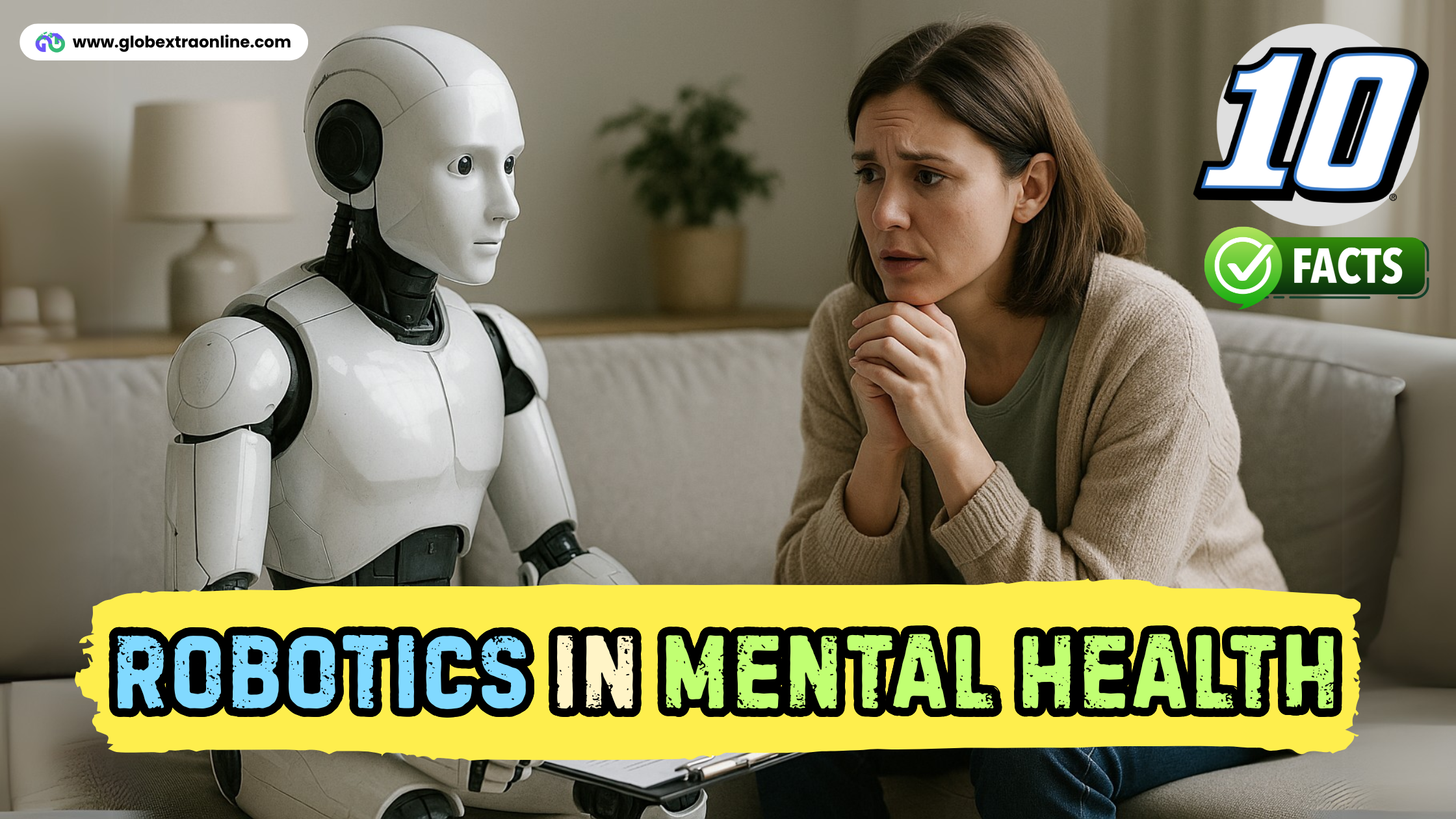Robotics in mental health is a game changer in the mental health space. With the introduction of Robotics, doctors can diagnose, treat, and support patients more efficiently. If you are curious to see the role of Robotics in mental healthcare, then our blog will explain through 10 amazing ways. Read on to discover how it is transforming the medical world.
At Globextra, we believe in staying ahead of tech trends that redefine industries. Since robotics is creating waves in the healthcare sector, we thought of bringing you this blog. Read on as we uncover 11 defining ways robots are changing the landscape of mental wellness.
Robotics In Mental Health – 10 Path-Breaking Ways It Is Shaping The Industry
New-age robotics is transforming mental health, benefiting practitioners and patients alike. From automating everyday tasks to assisting in surgeries, these smart machines are everywhere. So, let us explore how they will be changing the dynamics of the medical industry through 10 defining aspects. Ready to know about them?
1. What Is Robotics In Mental Health Industry- The Term Explained In A Broad Aspect
Robotics in mental health refers to the involvement and use of automated systems like telepresence robots, social robots, and AI-powered interactive tools that have only added to the evolution of the mental health care industry. These smart helpers are not only helping in tasks like remote therapy sessions, patient monitoring, interactive therapeutic interventions, and even providing companionship, but their contribution goes beyond the mentioned points.
2. The History Of How These Autonomous Machines Came To Be Used In Mental Health Promises A Hooking Read
Let us see how and when it all began and what has us hooked every time we mention or read about its inception.
Since then, it has been constantly evolving and is helping doctors cure mental health concerns that were previously presumed to be incurable. If you are a regular reader, you may be wondering why we are stressing about mental health. To answer this, we urge you to read our blog about mental health and through 17 tech innovations in mental health, find out its importance.
3. Ever Considered The Benefits Of These Automated Machines In Mental Health?
The use of robotics in mental health is transforming the way patients receive care and has only been aided by making mental health support more accessible, personalized, and effective. Some prime advantages are mentioned below.
- Increased Accessibility to Mental Health Care
Robots and AI-powered chatbots provide mental health support on a 24/7 basis, helping individuals who may have difficulty accessing traditional therapy due to location, financial issues, or stigma.
- Reduced Therapist Workload
Mental health professionals can now use robotics to automate routine tasks, track patients’ progress, and offer AI-driven support thereby allowing them to focus more on complex cases.
- Improved Patient Engagement
Social robots and AI chatbots provide interactive and engaging mental health support. This has made therapy sessions more comfortable, especially for children, the elderly, or individuals with anxiety.
- Personalized Therapy and Support
AI-driven robots analyze user data to make mental health cases more personal and provide coping strategies on a more personal level. They also offer emotional support based on individual needs.
- Non-Judgmental Support
Some individuals may feel more comfortable discussing their emotions with AI-powered mental health robots than with a human therapist, so they can talk about whatever they want and be assured that they will not be judged. This helps such patients be more expressive, and through which doctors can help them recover faster.
- Early Detection of Mental Health Issues
Robotic tools can monitor speech patterns, facial expressions, and behavior to detect early signs of depression, anxiety, or other mental health disorders, helping with early detection and cure.
- Assistance in Cognitive and Behavioral Therapy (CBT)
AI-powered robotic systems can guide individuals through CBT exercises, helping them rethink any negative thoughts that might cross their minds, develop coping strategies, and track their progress over time.
- Crisis Intervention and Suicide Prevention
Telepsychiatry robots and AI-driven chatbots can provide immediate support during mental health crises, offering coping techniques or directing individuals to emergency services.
- Data-Driven Insights for Better Treatment
Robotic systems collect and analyze mental health data, helping therapists track patient progress, alter treatment plans, and make more informed decisions.
- Encouraging Routine Mental Wellness Practices
Mental health robots and AI apps can remind users to practice mindfulness, engage in relaxation exercises, and maintain healthy habits, promoting overall mental well-being.
4. Are There Any Risks of Using Robotics in Mental Health?
Let us see some dark sides that these automated smart devices are capable of in this section.
- Limited emotional intelligence
Robots cannot understand and respond to complex human emotions, which is crucial for building rapport and trust.
- Potential for patient detachment
Patients may feel less connected to a robot as compared with a human and may not be able to be vocal about their feelings.
- Technical limitations
Glitches or malfunctions in robotic systems could disrupt therapy sessions and cause uneasiness for patients.
- Privacy concerns
Data collected by robotic systems may raise privacy concerns, especially when dealing with sensitive mental health information.
- High cost of implementation
Maintaining advanced robotic systems can be expensive and limit access for some patients.
- Social stigma
Some patients may be hesitant to engage with a robot due to the social stigma associated with using technology for mental health treatment.
5. Curious To Know Some Areas That Rely On The Usage Of Robotics When We Talk About Mental Health?
Let us see some areas where these smart helpers are used in the mental health industry.
- Companionship for the Elderly and Isolated
Robotic apps provide comfort and also help individuals experiencing loneliness, particularly those in senior care facilities, fight loneliness.
- Anxiety Management
These smart devices can be programmed to guide users through relaxation techniques like deep breathing exercises or mindfulness practices and help manage anxiety symptoms.
- Mental Awareness
They can help individuals improve memory, attention, and problem-solving skills through interactive games and exercises.
- Therapy Facilitation
Robots can be used as tools during therapy sessions, providing visual or audio tools to support exposure therapy for phobias, or can also be used to guide patients to improve their memory or thinking abilities.
- Data Collection and Monitoring
Built-in sensors can track key signs, facial expressions, and movement patterns to monitor mood changes and identify early signs of mental health concerns.
6. How Are These Automated Machines Helping Humans In The Mental Health World?
Let us see how these automatons are making life easy for humans when it comes to mental health in this section.
- Robots can provide companionship and help people feel less lonely.
- Act like a human therapist.
- Can analyze huge amounts of data & history and suggest a solution accordingly.
- Robots can use past sessions as references, compare and highlight patterns in patient data that might otherwise go unnoticed. Thus, improving therapy.
- Helps by efficiently taking notes without missing any details and thus helps in a more enhanced session.
7. Will These Automated Bots Take The Job Of Doctors In The Mental Health Sector?
Let us see if this is a possibility or an assumption in this section.
We cannot deny that technology is evolving at a rate faster than we imagined, and some jobs will be replaced by technology in the future. Having said this, virtues like empathy, creative thinking, emotions, human touch, etc are some emotions that these machines do not possess.
Mental health is one such industry that is centered around the mentioned virtues and is safe from being replaced by robotics.
Want to know more jobs that are safe from getting replaced? Read our blog on artificial intelligence and let our 22 crunchy bits tell you about other jobs that cannot be replaced by these smart devices.
8. The Types of Robotic Therapy & Their Applications In Mental Health Domain
Let us see how robotics is used in different types of therapies.
- Social Robots: AI-powered robots that provide companionship and assist in therapy sessions.
- Telepresence Robots are used for remote psychiatric sessions via video consultations.
- Chatbot Therapy: AI chatbots offer mental health support through text-based interactions. Want to know what chatbots are? Read our blog on Chatbots, where these smart yet talkative bots introduce themselves through 21 talkable points.
- Rehabilitation Robots: Assist patients who are recovering from neurological disorders or mental trauma to cope better and improve faster.
- Cognitive AI Assistants: Help individuals with dementia, PTSD, and autism through interactive exercises.
Each type enhances the therapy, making mental health care more personalized and effective.
9. How Robotics Will Transform the Indian Medical Industry: Key Benefits and Sectors of Impact
Robotics is set to make impactful changes in the Indian medical industry, and we will see how these automated medical devices will reshape India’s healthcare industry. Let us learn more about this below.
Ways In Which Robotics Will Impact The Indian Mental Health Industry
Robotics will revolutionize the Indian mental health sector in the mentioned ways.
- Improved Patient Care and Accuracy
- Access to Healthcare in Rural Areas
- Robotic-Assisted Rehabilitation
- Automation in Diagnostics and Monitoring
- Medical Training and Education
Sectors Where Robotics Will Be Useful in India’s Medical Industry
- Surgical Robotics
- Telemedicine and Remote Care
- Elderly Care
- Rehabilitation and Physiotherapy
- Medical Automation and Administrative Tasks
- Diagnostics and Imaging
With the advancement of AI and robotics, healthcare will become more accessible, accurate, and efficient. While challenges like infrastructure, training, and affordability may be concerning areas, the overall aspect of robotics in healthcare is promising. By adopting these cutting-edge technologies, India can improve the quality of care, provide remote access to patients in need, and change the dynamics of their mental health industry.
10. The Future of Robotics in Mental Health: Revolutionizing Care and Treatment
The future of robotics in mental health holds huge potential to change the present-day scene of mental health. Let us see what can be expected out of these smart assistants in the future.
- Remote mental health support.
- Robotic-enabled therapy assistants
- Telepresence robots
- Long-term management of mental health disorders
As robots continue to learn and grow, they will enhance the overall mental health care experience by helping patients feel more empowered, engaged, and supported in their recovery journey.
This concludes our blog on Robotics in mental health & we hope you find this informative. Want to explore more about AI in mental health? Subscribe to our newsletter for the latest insights!
Take Care of your mental health, as you mean the world to someone!!!


Leave a Reply